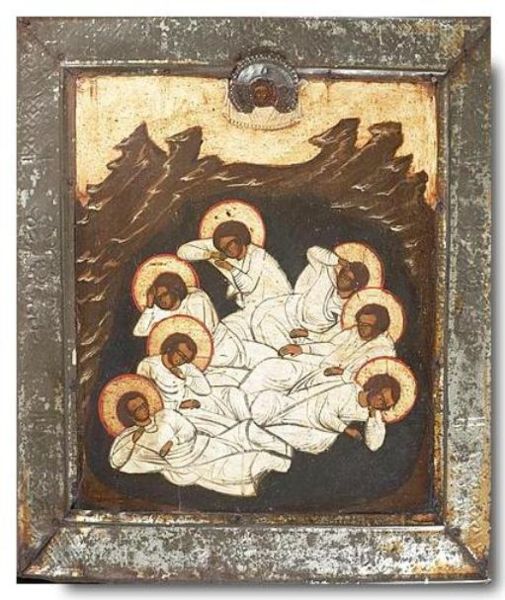Welcome to our monthly newsletter, dear reader,
• Our first library addition this month is a small selection of texts and articles about the Seven Holy Sleepers of Ephesus (the “Companions of the Cave” of the Qur’an), including their precedents as told in a number of ancient narratives, and their influential depiction in the medieval Golden Legend (Legenda aurea).
Some will say, “They were three, their dog was the fourth,” while others will say, “They were five, their dog was the sixth,” only guessing blindly. And others will say, “They were seven and their dog was the eighth.” Say, O Prophet, “My Lord knows best their exact number. Only a few people know as well.” (Quran, 18:22)
19th-century Russian icon.
• Next we look at the pre-Hispanic traditions of wisdom in Mexican and Central American lands, with an article by Diana Magaloni Kerpel on the “Powerful Words and Eloquent Images” of the Florentine Codex, one of the rare documents left as a witness to the knowledge of the “masters of the black and red inks”, and their ideas about the supernatural origins of art and song.
For the shamanic tradition of the Tzeltal, the sacred words pronounced in the chants by the shamans are seen as flowers that unfold and open; sacred, powerful words are said to have a distinct aroma, just as real flowers do when they open… Flowers possess the energy of the deities, their tonalli or characteristic “solar heat”… Flowers are mentioned as the jewels of the otherworld; flowers come from “inside the mountains,” and they are described as “worthy, scented, fragrant, dressed in dew with the glow of the rainbow.” Thus flowers come from the “other side”… and their colors and scents are intrinsic to their otherworldly power. As León-Portilla has argued, the term in cuicatl in xochitl, “the song, the flower,” is used in Nahua thought to express what is considered “truthful on earth,” what is worthy.
Flowers from the Florentine Codex.
• Finally, still on the topic of cosmic and human language, a chapter on the esoteric linguistics of prayer in Japanese Buddhism, from The Weaving of Mantra by Ryuichi Abe.
People of the world are unaware that each letter of the alphabet is already complete in its graphic form, while possessing infinite meanings of reality… People of the world do not know that each letter is replete with reality, that is, the words of reality (shingon), mantras. Words spoken without this knowledge are the words of delusion, which lead beings to the suffering of the three evil transmigratory realms. When they become aware of this knowledge of reality (of their alphabet letters), they annihilate all their evil karma and attain the all-embracing wisdom. This occurs just as one’s medical knowledge can transform a dangerous poison into the most beneficial cure.




